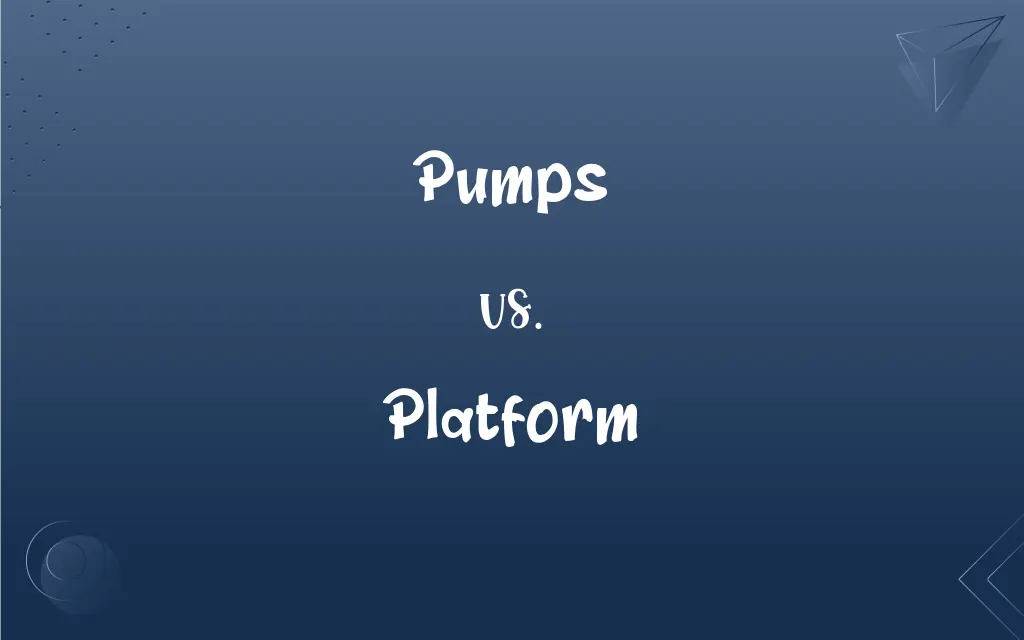Pumps vs. Platform: What's the Difference?
Edited by Janet White || By Harlon Moss || Published on November 19, 2024
Pumps are shoes with a low-cut front and usually a high heel, whereas platforms are shoes with a thick sole under the entire foot.

Key Differences
Pumps, traditionally known for their closed-toe and high heel design, are considered classic footwear for formal occasions. Platforms, on the other hand, feature a thick sole that elevates the entire foot, offering more comfort and stability than pumps.
Pumps often accentuate the arch of the foot with their heel design, while platforms distribute weight more evenly due to their thick soles. This structural difference makes platforms more suitable for prolonged wear, whereas pumps are often chosen for their elegant appearance.
In terms of style versatility, pumps are a staple in professional and formal attire, offering a sleek and polished look. Platforms, conversely, have a more casual or edgy aesthetic, lending themselves to a variety of fashion statements.
The heel height in pumps can vary, but they typically maintain a slender and minimalist profile. Platform shoes, in contrast, are characterized by their bulky sole, which can range from subtly thick to extravagantly high.
From a historical perspective, pumps have been a part of women's fashion for centuries, symbolizing sophistication. Platforms gained popularity in different eras, notably the 1970s, and are often associated with bold fashion choices.
ADVERTISEMENT
Comparison Chart
Sole Thickness
Thin sole, primarily under the heel
Thick sole under the entire foot
Style
Elegant, formal, and professional
Casual, bold, and often edgy
Comfort
Less comfortable for long wear due to heel
More comfortable due to even weight distribution
Fashion Association
Timeless, classic charm
Associated with specific fashion eras and statements
Structural Emphasis
Accentuates foot's arch and elongates legs
Adds height with less strain on the arch
ADVERTISEMENT
Pumps and Platform Definitions
Pumps
To move something using a mechanical or physical device.
He pumped water from the well for the garden.
Platform
A standard for hardware or software systems.
The application runs on multiple computing platforms.
Pumps
A high-heeled shoe with a closed, low-cut front.
She wore red pumps to complement her evening gown.
Platform
A shoe with a thick sole.
She wore platforms to add height to her ensemble.
Pumps
To fill something with air or gas.
She pumped the air mattress for the guests.
Platform
A raised level surface on which people can stand.
The speaker stepped onto the platform to address the crowd.
Pumps
A device used to move fluids or air.
The mechanic used a hand pump to inflate the bicycle tires.
Platform
A political party's declared principles or policies.
The candidate's platform focused on healthcare reform.
Pumps
A light, soft shoe for sports, especially dancing.
The dancers wore ballet pumps for the rehearsal.
Platform
A service, space, or opportunity for presenting ideas.
The conference provided a platform for innovative discussions.
Pumps
A machine or device for raising, compressing, or transferring fluids.
Platform
A horizontal surface raised above the level of the adjacent area, as a stage for public speaking or a landing alongside railroad tracks.
Platform
A vessel, such as a submarine or an aircraft carrier, from which weapons can be deployed.
FAQs
What are pumps?
Closed-toe shoes with a high heel, often worn for formal occasions.
Are pumps comfortable for long wear?
Generally less comfortable due to the heel, especially for extended periods.
Can platforms be considered formal wear?
While less traditional, certain platform designs can be suitable for formal events.
Do platforms offer better stability than pumps?
Yes, due to the even distribution of weight across the sole.
Can pumps be flat-soled?
Traditionally, pumps have a heel, but some modern designs may have a low or flat heel.
What defines a platform shoe?
A shoe with a thick sole under the entire foot.
What styles do pumps complement?
They pair well with professional and elegant attire.
Is there a difference in sole thickness between pumps and platforms?
Yes, platforms have a noticeably thicker sole than pumps.
Are platform shoes a recent fashion trend?
Platforms have been in and out of fashion since the 1970s.
Can men wear pumps or platforms?
Yes, both styles are available in men's fashion, though less commonly.
Are platforms versatile in fashion?
Yes, they can be styled with both casual and edgy outfits.
What's the typical heel height for pumps?
It varies but usually ranges from 2 to 4 inches.
What materials are used in platform shoes?
They can be made from a variety of materials, including leather, rubber, and synthetic compounds.
Are there health considerations with wearing pumps?
Prolonged wear can lead to foot and back discomfort due to heel height and lack of support.
Are pumps suitable for all weather conditions?
They are best suited for dry conditions due to their typical design and materials.
Can platforms be worn in professional settings?
Depending on the design, some platform shoes can be appropriate for professional environments.
Do pumps offer any arch support?
Generally, they offer minimal arch support.
Are there athletic versions of pumps?
Not typically, as pumps are designed for style rather than athletic functionality.
Do platforms always have a high heel?
No, some platforms have a moderate or even flat heel.
Can pumps be casual wear?
They are more commonly associated with formal wear, but some styles can be casual.
About Author
Written by
Harlon MossHarlon is a seasoned quality moderator and accomplished content writer for Difference Wiki. An alumnus of the prestigious University of California, he earned his degree in Computer Science. Leveraging his academic background, Harlon brings a meticulous and informed perspective to his work, ensuring content accuracy and excellence.
Edited by
Janet WhiteJanet White has been an esteemed writer and blogger for Difference Wiki. Holding a Master's degree in Science and Medical Journalism from the prestigious Boston University, she has consistently demonstrated her expertise and passion for her field. When she's not immersed in her work, Janet relishes her time exercising, delving into a good book, and cherishing moments with friends and family.







































































